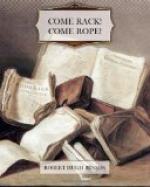“Yes, mistress,” said the priest behind her. “That is the place of execution for those who die within the Tower—those usually of royal blood. My Lady Salisbury died there, and my Lady Jane Grey, and others.”
He laid his hand gently on her arm.
“You must not look so grave,” he said, “you must gape more. You are a country-cousin, madam.”
And she smiled in spite of herself, as she met his eyes.
“Tell me everything,” she said.
They went together nearer to the church, and faced about.
“We can see better from here,” he said. Then he began.
First there was the Lieutenant’s lodging on the right. They must look well at that. Interviews had taken place there that had made history. (He mentioned a few names.) Then, further down on the right, beyond that corner round which they had come just now, was the famous water-gate, called “Traitors’ Gate,” through which passed those convicted of treason at Westminster, or, at least, those who were under grave suspicion. Such as these came, of course, by water, as prisoners on whose behalf a demonstration might perhaps be made if they came by land. So, at least, he understood was the reason of the custom.
“Her Grace herself once came that way,” he said with a twinkle. “Now she sends other folks in her stead.”
Then he pointed out more clearly the White Tower. It was there that the Council sat on affairs of importance.
“And it is there—” began Anthony harshly.
The priest turned to him, suddenly grave, as if in reproof.
“Yes,” he said softly. “It is there that the passion of the martyrs begins.”
Marjorie turned sharply.
“You mean—”
“Well,” he said, “it is there that the Council sits to examine prisoners both before and after the Question. They are taken downstairs to the Question, and brought back again after it. It was there that—”
He broke off.
“Who is this?” he said.
The court had been empty while they talked except that on the far side, beneath the towering cliff of the keep, a sentry went to and fro. But now another man had come into view, walking up from the way they themselves had come; and it would appear from the direction he took that he would pass within twenty or thirty yards of them. He was a tall man, dressed in sad-coloured clothes, with a felt hat on his head and the usual sword by his side. He was plainly something of a personage, for he walked easily and confidently. He was still some distance off; but it was possible to make out that he was sallowish in complexion, wore a trimmed beard, and had something of a long throat.
Father Campion stared at him a moment, and, as he stared, Marjorie heard Mr. Babington utter a sudden exclamation. Then the priest, with one quick glance at him, murmured something which Marjorie could not hear, and walked briskly off to meet the stranger.




